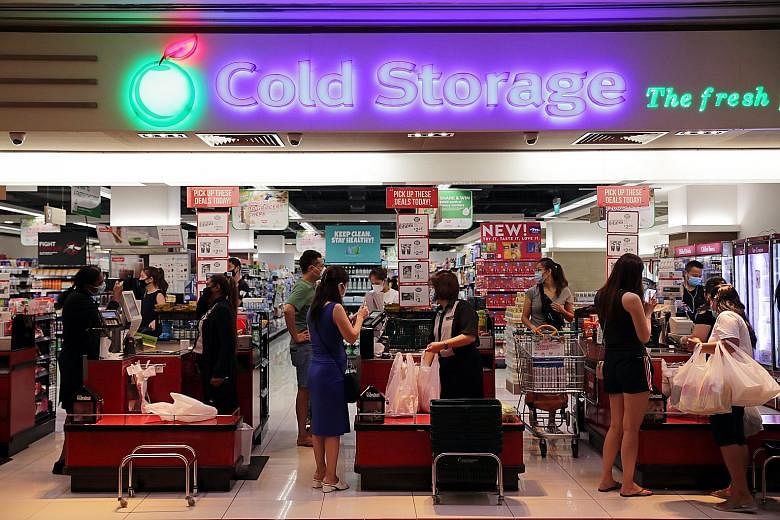The familiar lightning rod issue of the goods and services tax (GST) has returned this election, with opposition parties in broad agreement in opposing a planned hike from 7 per cent to 9 per cent between 2022 and 2025.
Most, like the Workers' Party (WP) and the Progress Singapore Party, are calling for the GST to be held at the current 7 per cent, while others such as the Singapore Democratic Party (SDP) and Reform Party have gone further to call for a suspension to the GST or to exempt essential goods from the tax.
But the ruling People's Action Party (PAP) has defended the need to raise the GST by 2025 to fund the country's recurrent spending needs, and questioned the other parties on where they intend to make up the shortfall should GST collection be suspended, or the GST hike be scrapped.
The matter was raised during a televised live debate last Wednesday, when the PAP's Dr Vivian Balakrishnan said SDP chief Chee Soon Juan was not being forthright with Singaporeans about how his party intended to plug the fiscal gap should the consumption tax be suspended.
Part of the SDP's campaign platform is to cut the GST to zero until the end of next year, which the party says will stimulate the economy and help businesses.
Dr Chee said in the SDP's first e-rally last week that raising the GST amid the pandemic "is not smart economics".
The SDP has proposed raising the income tax for the top 1 per cent of income earners and reinstating estate duty, among other fiscal measures, but Dr Balakrishnan said these do not account for the fiscal hole that suspending the GST would create.
"I don't think you've been open with our people... do you realise, each year, at current rates, you will create a hole therefore of $11 billion?" he asked.
Dr Balakrishnan, who is Foreign Minister, said the PAP did not believe in class warfare, and urged Singaporeans not to "take it out against people who, through no fault of their own, have been somewhat more successful".
"Have a care that you are not actually engaging in class warfare, and you're not trying to divide our society," he told Dr Chee. "I believe Singaporeans remain a united, cohesive people, and we want to uplift everyone."
The impending GST increase also came up during an online Mandarin dialogue broadcast on Zaobao.sg last Thursday.
Minister for Trade and Industry Chan Chun Sing asked the WP's Mr Kenneth Foo about his party's proposal to do away with the planned tax hike, which was announced by Finance Minister Heng Swee Keat in Budget 2018.
The last GST hike, from 5 per cent to 7 per cent, took effect in 2007.
The WP argues in its manifesto that the Government should tap alternative sources of revenue, such as income from land sales. It also suggests increasing the net investment returns contribution by up to 10 per cent.
Since 2016, the returns from Singapore's invested reserves have been the single largest source of government revenue.
The PAP notes in its manifesto that $6 billion has been set aside to help cushion the impact of the GST hike on Singaporeans, with lower-income households to receive enough help to offset the tax increase for 10 years.
"I want to ask them a very simple question - who will foot the bill?" said Mr Chan, who is the PAP's second assistant secretary-general.
"An ageing population, infrastructure that has to be renewed, all these are very large undertakings," he added.
Mr Chan said Singapore has three options to fund its expenditure: using money saved up by previous generations, getting the current generation to foot the bill, or to pass the buck to future generations.
"Which of these choices does the WP want?" he asked.
Mr Foo replied that the Government has not made public its income and expenditure projections for the next decade.
"In the absence of data, would a responsible opposition be able to support this Budget in Parliament?" he asked.
"Would it be able to support the GST increase from 7 per cent to 9 per cent? This is completely impossible."
On the question of who foots the bill, Mr Foo added that the WP's manifesto is "budget-neutral".
But if money needs to be spent, the most important thing is to focus on who the money is being spent on, he said. "If we put our people first, we have to ask: Do we use the money, or not?"
Mr Chan replied that given the global economic downturn, raising other forms of taxes - such as income tax, property tax and corporate tax - will be challenging.
For instance, many countries faced with a shortfall in tax revenue are now trying to compel their multinational firms to make up the difference in taxes back home for their investments abroad, Mr Chan said in an episode of Straight Talk With PAP last week.
And it will be increasingly difficult to earn as much as before from investing the country's reserves, he said in the Zaobao dialogue.
"This is not child's play. These are challenges that we will be facing over the next 10 years."
Mr Foo responded that the WP's stance remains the same, to which Mr Chan replied: "Let me be frank: If we had, in the past, done what the WP is proposing, we would not have enough money to see us through the crisis today."

